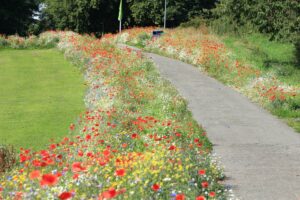
Durham Town and Parish Council are leading the way in wildflower meadow creation to tackle the Climate and Ecological Emergencies
As we come into march, we enter Natural Environment month; the natural environment is threatened by climate change which could bring floods, storms, droughts, wildfire risk and new pests and disease.
Whilst significantly threatened by climate change, nature within County Durham is a vital part of the solution to it. Our county is fortunate to host a diverse range of ecosystems, from peatlands to the coast, which when healthy, can store significant amounts of carbon, help us prevent consequences of climate change, like flooding, and support biodiversity recovery.
Durham County Council has a number of projects, including peat restoration and woodland creation, to combat the loss of biodiversity and natural environment decline and you can read more about this in our second Climate Emergency Response Plan.pdf.

Leading the way, locally
Great Aycliffe Town Council has taken action to combat the decline in biodiversity to bring benefit to its residents and wildlife through its creation of wildflower meadows.
Steven Cooper, Works, and Environment Manager at Great Aycliffe Town Council was startled to hear that UK wildflower meadows have declined by 97% since the 1930s and committed to combatting this using land owned by the Town Council.
The Town Council has restored 45,000 square meters of wildflower meadows, equivalent to more than eight football pitches! This work brings benefit to both residents and the natural environment alike by supporting pollinators such as bees, providing undisturbed cover for newts and frogs and improving the natural beauty to the town.
Wildflower meadows and grassland in the UK can store up to three tonnes of carbon per hectare, per year and therefore this work not only addresses the ecological emergency, but the climate emergency too, helping the county to achieve carbon neutrality by 2045.
Get involved
You too can make a difference, and support the fight against climate change and loss of biodiversity; by planting wildflower seeds in your garden, taking part in no-mow May or by simply sharing this article with friends, family, and local Town Councils.

